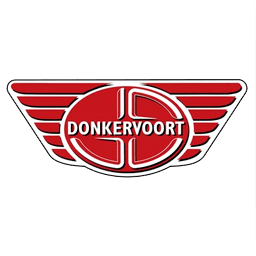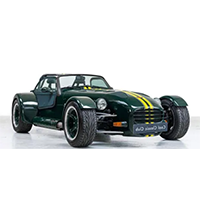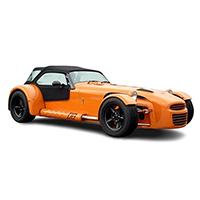
Catalog / Donkervoort
Donkervoort: Dutch Engineering Meets Lightweight Performance
Donkervoort Automobielen B.V. is a Dutch sports car manufacturer that has been pushing the boundaries of lightweight performance since its inception in 1978. Founded by Joop Donkervoort, the company has built a reputation for creating ultra-lightweight, high-performance sports cars that offer a pure and exhilarating driving experience.
The story of Donkervoort began when Joop Donkervoort, inspired by the Lotus Seven, set out to create his own interpretation of the lightweight sports car concept. The first Donkervoort, the S7, was introduced in 1978 and immediately caught the attention of enthusiasts for its raw performance and minimalist design.
Throughout the 1980s and 1990s, Donkervoort continued to refine its formula, introducing models like the S8 and S8A. These cars maintained the core principles of lightweight construction and driver engagement while incorporating modern technologies and safety features.
A significant milestone in Donkervoort's history came in 1994 when the company began a partnership with Audi. This collaboration led to the use of Audi's turbocharged engines in Donkervoort models, starting with the D20, which featured a 1.8-liter Audi 20VT engine. This partnership brought a new level of performance and reliability to Donkervoort's creations.
In 2000, Donkervoort unveiled the D8 series, which would become the foundation for many of the company's future models. The D8 represented a significant evolution in design and engineering, offering improved aerodynamics and even greater performance.
One of Donkervoort's most notable achievements came in 2004 when the D8 RS set a lap record for production cars at the Nürburgring Nordschleife, completing the circuit in just 7 minutes and 14.89 seconds. This feat demonstrated the exceptional capabilities of Donkervoort's lightweight, high-performance philosophy.
In recent years, Donkervoort has continued to innovate with models like the D8 GTO, introduced in 2011, which features a 2.5-liter Audi TFSI engine producing over 400 horsepower in a car weighing less than 700 kg. The company has also embraced advanced materials and technologies, incorporating extensive use of carbon fiber and other composites in their vehicles.
2022 saw the introduction of the F22, Donkervoort's latest model, which represents a new chapter in the company's history. Named after the founder's grandson and Formula 1 driver, Loek Hartog, the F22 combines Donkervoort's trademark lightweight construction with increased practicality and comfort, aiming to broaden the brand's appeal while maintaining its core values.
Today, Donkervoort remains a family-owned business, with Joop's son, Denis Donkervoort, at the helm as Managing Director. The company continues to produce a limited number of hand-built cars each year, maintaining its position as a niche manufacturer of some of the most exclusive and driver-focused sports cars in the world.
As the automotive industry moves towards electrification, Donkervoort faces new challenges and opportunities. The company's expertise in lightweight construction and performance engineering positions it well to adapt to future technologies while continuing to deliver the raw, engaging driving experience that has been its hallmark for over four decades.




